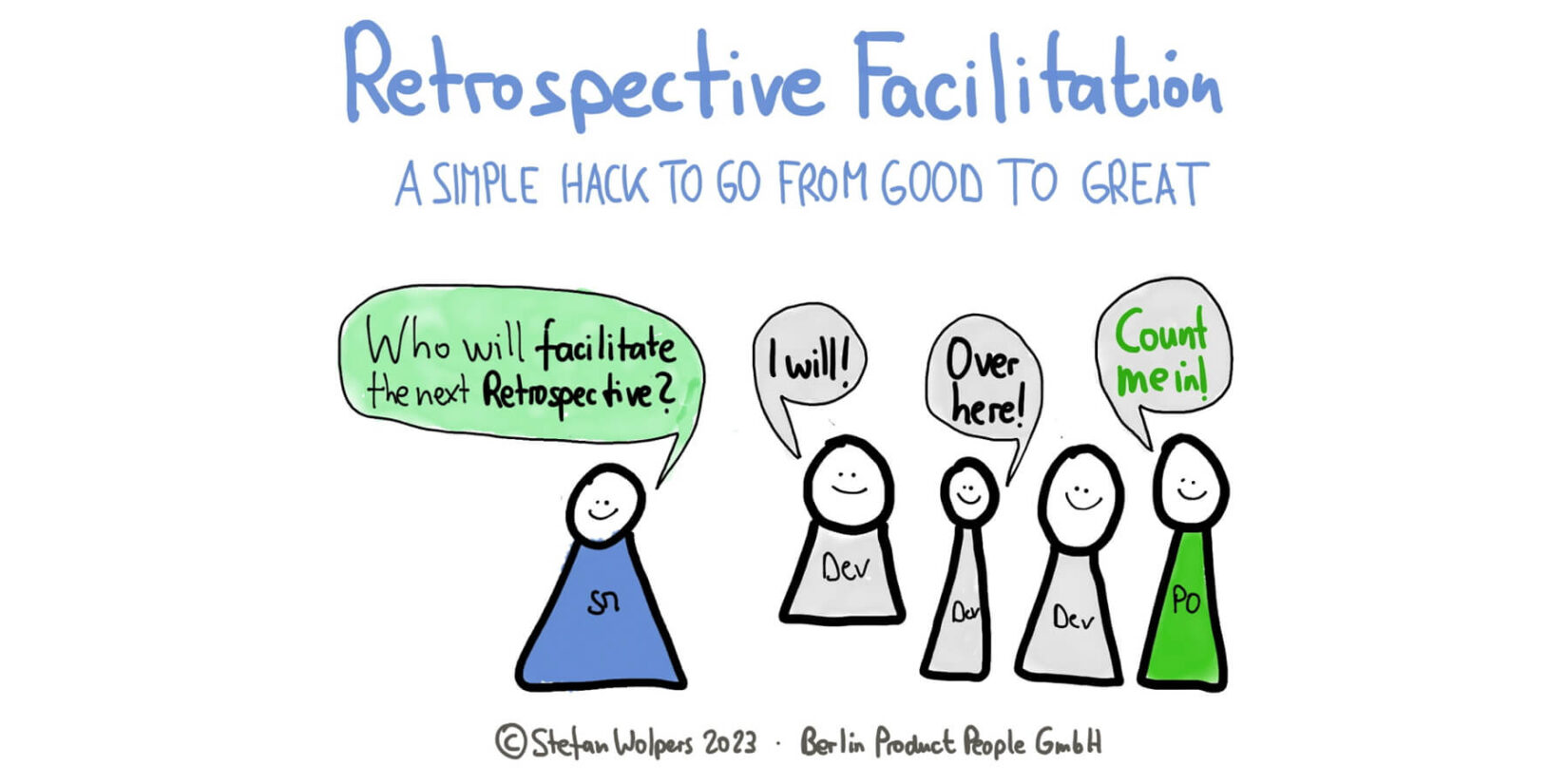TL; DR: Retrospective Facilitation — Going from Good to 🦄 Great
The magic technique to turn a boring Retrospective into an outstanding Retrospective is the rotation of the facilitator role equally among all team members. Check out the following ten benefits of this Retrospective facilitation practice, from boosting learning and skill development to ensuring continuity to encouraging ownership.

🇩🇪 Zur deutschsprachigen Version des Artikels: Retrospektiven Moderation: Eine einfache Möglichkeit, eine gute Retrospektive großartig zu machen.
🗞 Shall I notify you about articles like this one? Awesome! You can sign up here for the ‘Food for Agile Thought’ newsletter and join 46,000-plus subscribers.
🏅 The most popular discussion on LinkedIn this week was: Agile Failure Patterns in Organizations.
🎓 Join Stefan in one of his upcoming Professional Scrum training classes!
📖 Get notified when the Scrum Anti-Patterns Guide book is available!
Why Retrospective Facilitation Should not be Solely the Scrum Master’s Obligation
While Scrum Masters are often the natural facilitator of Scrum events, it is most beneficial to the Scrum team if they can also participate as ordinary team members in a Retrospective most of the time.
Check out the following ten benefits of this Retrospective facilitator practice, from boosting learning and skill development to ensuring continuity to encouraging ownership:
- Promotes Equal Participation: All Scrum team members are equally involved when sharing the role during Retrospective facilitation. This inclusion fosters collective responsibility and active engagement during Retrospectives.
- Boosts Learning and Skill Development: Taking turns as a facilitator allows everyone to develop leadership skills, improving overall team capabilities.
- Creates Empathy: When everyone experiences the role of Retrospective facilitator, there’s more understanding of its challenges, encouraging a supportive team environment.
- Drives Diversity of Thought: Different facilitators bring fresh perspectives, potentially uncovering novel solutions and improvements.
- Relieves the Scrum Master: When other Scrum team members share facilitation duties, the Scrum Master can focus more on participating and contributing.
- Ensures Continuity: If the usual facilitator is unavailable, others are ready to step in, ensuring that the Scrum team never skips this critical team event due to a lack of Retrospective facilitation skills. A welcome side-effect: Scrum Masters can enjoy a holiday, too! 🍹
- Fosters Transparency: The shared facilitator role can break down barriers and silos, encouraging open communication among the Scrum team members.
- Enhances Engagement: The novelty of different facilitators can keep team interest high, avoiding Retrospective fatigue.
- Encourages Ownership: By taking turns leading, team members often feel a greater sense of ownership and commitment to the actions agreed upon in the Retrospective.
- Nurtures a Self-Managing Team: Shared Retrospective facilitation supports the idea of self-organization, an essential aspect of Scrum, contributing to a truly agile team culture.
Cannot see the form? Please click here.
Educating Your Teammates in Facilitation Skills
You may ask yourself now: How can Scrum Masters help their teammates acquire facilitation skills?
As you embrace the practice of rotating the Retrospective facilitator role, you can support your teammates with the following steps. Firstly, provide them with resources for self-learning. Here’s a list of three valuable sources for Retrospective facilitation practices:
- Liberating Structures – an excellent collection of interaction patterns that fosters inclusivity and distributed decision-making.
- Retromat.org – a tool offering numerous exercises to spice up your Retrospectives.
- Management 3.0 – an excellent source for agile leadership and management tools, including facilitation techniques.
Secondly, Scrum.org offers several articles on facilitation techniques as well as a free Open Assessment for their PSFS Professional Scrum Facilitation Skills certification:
- Professional Scrum Competencies: Facilitation.
- Facilitation Techniques for Scrum Events
- Five Ways to Build Consensus.
- Trumpeting for All Voices to Be Heard: The White Elephant in Facilitating Participation.
Thirdly, offer guidance during the initial stages of their facilitation practice and encourage peer feedback after every Retrospective. Think of it as inspecting the previous Retrospective regarding facilitation techniques. Remember, the goal is continuous improvement, not perfection.
Conclusion
Rotating the Retrospective facilitator role is a wise move. It’s not just task rotation; it’s about fostering shared responsibility, diverse insights, and improving our overall team skills. It also provides a break for our Scrum Masters, promotes transparency, and staves off Retrospective fatigue. This practice encourages ownership and nurtures a truly self-managing team—a cornerstone of Scrum. As we aim for a thriving agile culture, it’s worth considering shared Retrospective facilitation. It’s more than a good idea; it’s smart Scrum practice.
What other Retrospective facilitation techniques have worked for you? Please share your experience with us in the comments.
Related Articles
60 ChatGPT Prompts Plus Prompt Engineering Guide for Scrum Practitioners
Liberating Structures for Scrum (5): Retrospective — First Principles
Prisoners of Retrospectives: Making Your Scrum Work #24
Sprint Retrospective Anti-Patterns — 31+2 Ways to Improve as a Scrum Team
Should Managers Attend Retrospectives? — Making Your Scrum Work #19
📅 Scrum Training Classes, Workshops, and Events
Learn more about Retrospective facilitation with our Scrum training classes, workshops, and events. You can secure your seat directly by following the corresponding link in the table below:
See all upcoming classes here.

You can book your seat for the training directly by following the corresponding links to the ticket shop. If the procurement process of your organization requires a different purchasing process, please contact Berlin Product People GmbH directly.
✋ Do Not Miss Out and Learn more about Retrospective Facilitation — Join the 12,000-plus Strong ‘Hands-on Agile’ Slack Community
I invite you to join the “Hands-on Agile” Slack Community and enjoy the benefits of a fast-growing, vibrant community of agile practitioners from around the world.

If you like to join all you have to do now is provide your credentials via this Google form, and I will sign you up. By the way, it’s free.
Support your team’s efforts regarding Retrospective facilitation by pointing to the free Scrum Anti-Patterns Guide:
